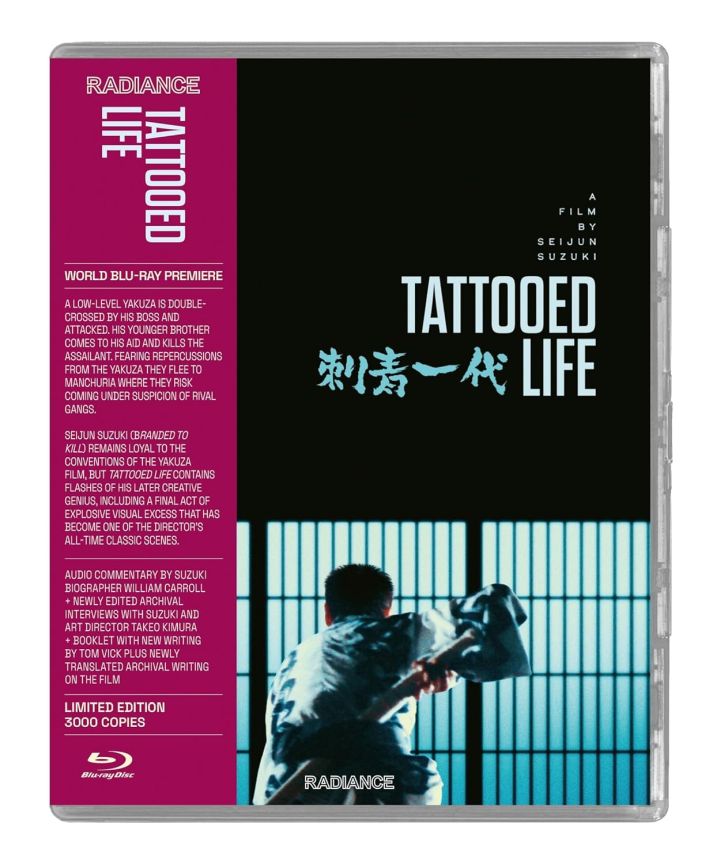
In the first act, there’s a murder, a betrayal, and two brothers go on the run. The last act features a pitched sword battle in the rain. In between… there’s wandering, construction work, and romantic misadventure. One brother gets a crush on the boss’s wife. The other is pursued by her sister. So… mostly normal yakuza stuff.
Buy Tattooed Life Blu-rayTattooed Life is a 1965 yakuza film directed by Seijun Suzuki. Famously, Nikkatsu Studios fired him when he took way too much advantage of their hands-off attitude towards director’s output. If a director was making a yakuza film, as long as there were sufficient fights and semi-nude ladies, directors were allowed a lot of leeway. In his latter films, Suzuki took this to such a degree that executives found his films nigh incomprehensible. They eventually fired him.
But that was a couple of years in the future. With Tattooed Life, Suzuki was only kind of weird. The movie follows Tetsu and Kenji, a pair of orphans. Kenji is a sensitive artist. Tetsu wants to send him to art school, so of course becomes a gangster to bankroll his tuition. He kills a mob boss for money but is betrayed and set up to die himself. Kenji saves Tetsu’s life but kills a man in the process.
He no longer believes he can be an artist with blood on his hands, so the two begin a wandering life. Their goal is to head toward Manchuria for work. After some shenanigans in a port city, they end up on a construction crew, where the bulk of the movie takes place. Kenji falls wildly in love with the owner’s wife. Her sister, Midori, falls in love with Tetsu.
No one knows of the brothers’ criminal past, and they try to keep it that way. And while Tetsu is aloof (except when he needs to beat the crap out of somebody, which happens more than you’d think on a construction crew), Kenji is flagrantly in love with the boss’s wife. He sketches her nude, makes a sculpture of her, meets her in clandestine barns. It doesn’t help the brothers’ situation.
Nor do local yakuza trying to muscle in on the construction crew’s legitimate work. They try to leverage what they know about Kenji and Tetsu against the non-criminal workers.
This leads to one of my favorite scenes in the film. It’s simple, but somewhat bizarre in how it shifts tone. The boss locks Tetsu in a shed, where he waits for the police. He’s ready to meet his fate. Kenji comes to the window, tells him to breakout. He does so at once, bashing the wooden-stake window out with a convenient sledgehammer. Just as he’s done, the door opens. The boss comes in and tells him he’s fired because he’s a felon. Tetsu, now scott free, of course takes a couple swings at the boss because… I don’t know. The boss dodges them easily, gives Tetsu a letter of introduction to a boat captain and his back pay. Then he sends him on his way. Suzuki handles this seemingly artless, move the plot along scene so smoothly that it becomes elegant.
Much of the middle film is full of fairly standard scenes, occasionally leavened with odd editing or unconventional camera movements. It isn’t until the climax of the film, which involves a rainstorm and a mass battle of swords and spears that Suzuki really lets loose. His love of unmotivated lighting colors and frames inside of frames turns the fight in a house of papers walls into some kind of psychedelic jigsaw puzzle. In one scene there are a few shots beneath the warriors looking directly up, as if they were fighting on glass. He expanded on this specific perspective device in Tokyo Drifter.
Tattooed Life is in color, and for much of the film has a natural palate, until the climax. The framing and cinematography are typically beautifully. The print on this release has some scratches and dirt, but that’s to be expected of a nearly 60-year-old low budget Japanese film. I think this Blu-ray release looks remarkably good.
Tattooed Life was the beginning of Suzuki’s troubles with his studios. It was the first film where executives began to tell him he was going too far with his artistic indulgences. Maybe it was incomprehensible for contemporary audiences, but it gives the film a modern panache that sets it apart from other yakuza stories. The man was only four films away from his career being taken away from him for over a decade. But from a modern-viewer’s perspective, with little treasures like this, it seems worth it.
Tattooed Life has been released on Blu-ray by Radiance films. Extras on the disc include a commentary by critic William Caroll, and newly edited video interviews with Seijun Suzuki (11 min) and art director Takeo Kimura (12 min.) There’s also an essay on Suzuki and the film by Tom Vick and a newly translated contemporary review in the provided booklet.